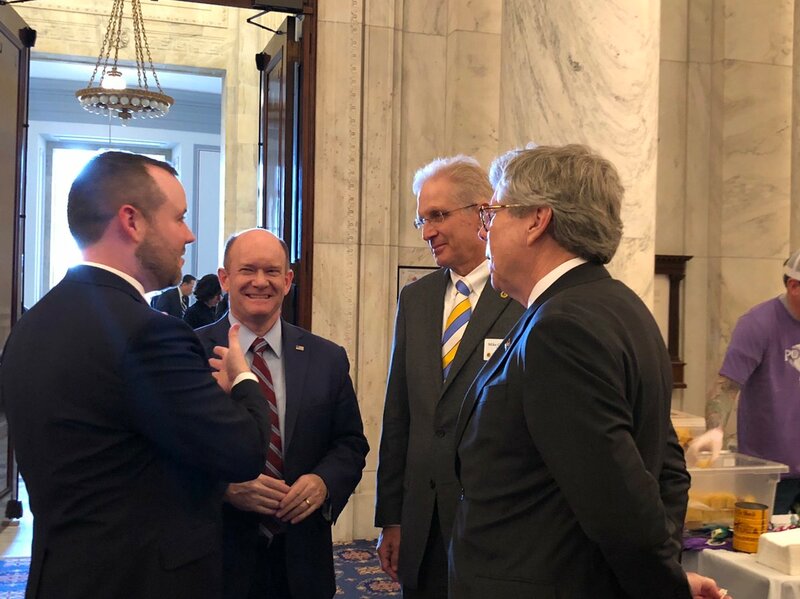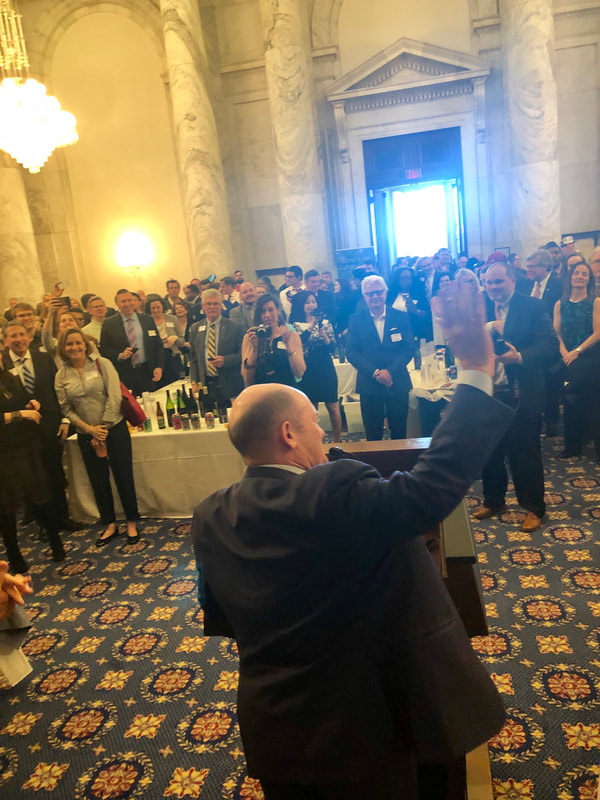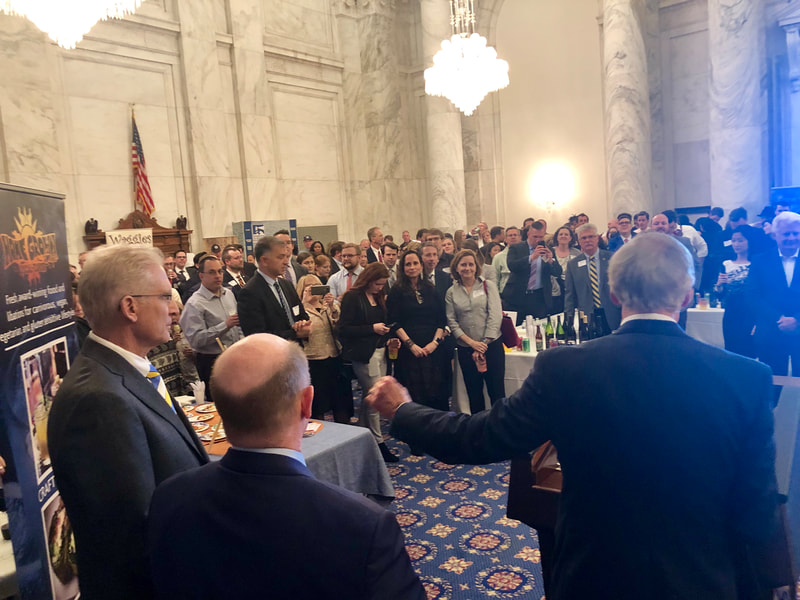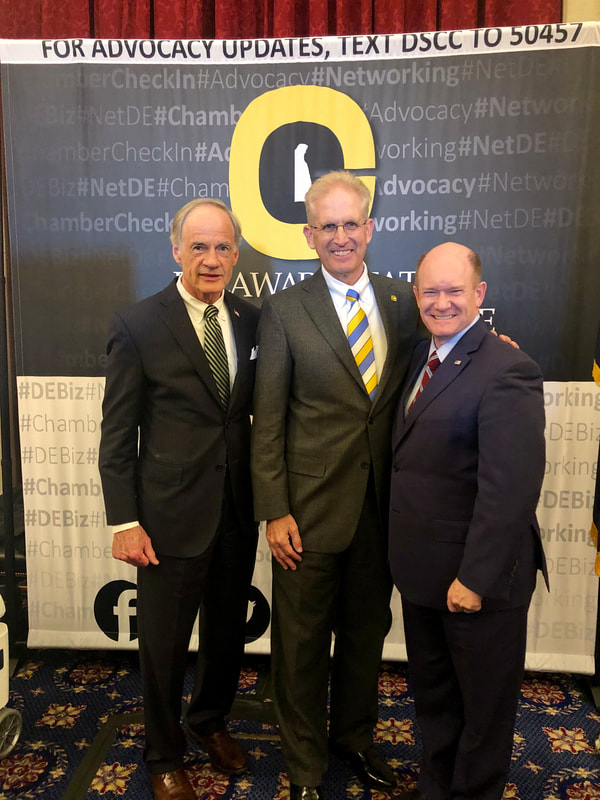|
by James DeChene
The General Assembly came back to a busy week where a number of bills related to the business community saw action: A bill to require apprentice and craft training on prevailing wage jobs was released from the House Labor committee, and is ready to be voted on, perhaps as early as next week. The Chamber testified against the bill, mainly because of technical issues related to the legislation, and the potential for contractors to be locked out of bidding and performing state work. The Chamber spoke in favor of a bill creating a Transportation Infrastructure Investment Fund (TIFF), a measure supported by the Administration, DelDot, and other industry groups. Two bills related to raising the personal income tax were heard in committee, and one was released. HB 15 adds two new top tax brackets—7.1% at $125,000, and 7.85% at $250,000. The Chamber opposed both bills in committee. The bill raising the minimum age to purchase tobacco products to 21 passed the House and now goes to the Governor for signature, as did a bill providing bonding authority to DelTech to assist in addressing their deferred maintenance needs. The General Assembly meets next week, prior to a two week Easter Break.
0 Comments
by James DeChene This week was the 8th Annual Taste of Delaware event, which the State Chamber held in partnership with honorary host, Senator Chris Coons. Postponed from December, the event this year coincided with spring in the nation’s capital, including cherry blossoms, sunny skies and an unfortunate last inning win by the Nationals. We saw 600 plus attendees who filtered in and out of the historic Kennedy Caucus Room, which featured scenes such as the Watergate hearings and nomination hearings of Supreme Court Justice Clarence Thomas. Over 20 vendors, including some of Delaware’s iconic establishments, the Starboard, Home Grown Café, SoDel Concepts, the DelTech and DelCastle culinary programs and more, served up tasty treats. These vendors showcased, from north to south what Delaware has to offer. Many thanks to our friends in Delaware who made the trip down, to the ex-pats who may have left the First State but are always happy to visit, and for the new friends we made across Capitol Hill. See you again this December. In other news, the General Assembly returns next week. Of note are two personal income tax bills to be heard in the House Finance Committee (DSCC opposes both), a bill mandating apprentices on certain public works projects to be heard in the House Labor Committee (DSCC opposes as written), and a bill creating an infrastructure investment fund at DelDOT supporting economic development to be heard in the Senate Transportation Committee (DSCC supports). Pictures from the Taste of Delaware:by James DeChene This week in Dover saw action in the Senate on a number of bills related to business. First, SS2 for SB50 directs money from the bond bill to be issued to DelTech, along with bonding authority, to help address the college’s deferred maintenance issues reported on before. The bill’s main difference from the original SB50 is the removal of the statewide property tax provision as a revenue source. Also in the Senate was SS1 for SB48, which mandates journeyman and apprentice craft training for those who work on publics works projects. The Chamber, ABC, Drive Delaware Forward, and others, worked unsuccessfully to modify the bill so that its passage would not adversely impact small businesses, or those businesses located where no training programs exist within reasonable distances (in some cases, apprentices must travel 80 miles each way to receive certified training). The bill now moves to the House where efforts to modify the bill will continue. Next week the General Assembly is out of session for JFC and Bond break. Upon their return, work will continue on criminal justice reforms, including the introduction of a revamp of Delaware’s criminal code. Stay updated on legislative issues through our Chamber Action Network video series as well. Sponsored by Ruggerio Willson.
by James DeChene
Before we get to what happened in Dover this week, a reminder that our networking event at the Delaware National Guard Joint Force Headquarters is a week away. This is your chance to:
And now onto Dover. This week the JFC continued to hold meetings hearing budget requests from state agencies. I attended the Departments of Insurance, Labor, and Natural Resources and Environmental Control (DNREC) hearings, and each secretary gave a good overview of what their offices are doing and plans for next year. A few items of note included the work the State Chamber, and others like ABC, DCA, Labor and legislators, have done to address issues related to the Workplace Fraud Act and how work is performed on construction sites. That work continues, and I’m thankful that we’re reaching consensus on some big issues that will have a positive impact on the industry and its workers. Of note from DNREC, Secretary Garvin made the announcement of a website launch in the coming month that will track permit applications made to the department. As you know, the State Chamber has been working with agencies like DELDOT and DNREC on streamlining their permitting processes to help development projects become 'shovel ready' faster. This tracking mechanism, apparently similar to what DELDOT has created, will show not only delays, or speed, from the DNREC side but also track if applications are missing data, causing a slowdown from the business side. More to come once the website goes live. Hope to see you next week at the Guard event. by James DeChene
This week kicked off the first round of Joint Finance Committee Hearings. Meeting throughout February, JFC members will hear from each state government agency on what their budget needs are for the next year and what and how the programs they provide are faring. Of note this year is the Governor’s Recommended Budget setting aside 2% of revenues to be used in times of economic downturn. That roughly $90 million is added to $45 million that was set aside last year. This means there is a $135 million pot of money that will be carried forward into next year’s budget, given legislators follow the budget plan. The problem will be if legislators choose to ignore the Governor and invest that money in long-term programs requiring ongoing revenues to sustain them. The State Chamber has been bullish on supporting efforts of budget stabilization and remains committed to that effort. Also of note this week was a CNBC article on jobs at risk of automation. According to the article, automation will impact 25% of the US working population and many of the jobs that are either entry level, or slightly above, including cashiers, customer service representatives, and even commercial truck drivers. You can read Mike's President's Message for more on that and a link to the article. What this means functionally for policy makers is that focusing on legislative items like raising the minimum wage or creating other barriers to employment will only serve to hasten the demise of these jobs. Kiosks and other self-service centers will be adopted more quickly, leaving behind a displaced workforce lacking the training or skills necessary to move on to their next jobs. Instead, focus should be on providing skills training to targeted industries, so instead of being a cashier, a person can be a technician working to maintain and repair the kiosk. by James DeChene
This week’s focus in Dover was on two bills directed toward the 500 federal workers living in Delaware currently furloughed. The first bill, which passed both the House and Senate, allows these workers to petition the court to halt eviction and/or loss of insurance policies or automobiles due to non-payment for the duration of the federal shutdown and for a duration of 120 days after. It would also limit the amount loan holders could charge during this time period, capped at 6%, no matter the original loan terms. The second bill, which passed the House, but failed in the Senate, would provide furloughed workers the opportunity to apply for state backed, low interest loans. Also this week the Governor announced his recommended budget. Of note to Chamber members was the outlining of how a newly created infrastructure fund ($10 million dollars) would be managed, allocating $15 million to colleges and universities toward economic development initiatives; adding $7 million additional funding in the Bond bill to UD, DSU and DelTech, allocated for deferred maintenance; and setting aside $12.5 million to Delaware’s Strategic Fund. The General Assembly will be in recess throughout February as the Joint Finance Committee will meet to hold budget markup sessions. They will return March 5. by James DeChene
The Delaware Economic and Financial Advisory Council (DEFAC) issued its December forecast on Wednesday afternoon. The December forecast is what Governor Carney will use when finalizing his recommended budget, to be released on January 4th. For the first time, his budget will utilize portions of the budget smoothing process, a legislative proposal that failed last year, but was issued in part via Executive Order. The order places a limit on spending growth and sets aside a portion of the surplus into a Budget Reserve Account. DEFAC reported spendable cash (98% of projected revenues) is up from the last forecast issued in September by $66.6 million. It also projects an increase of revenue of 1.7% for FY19 and 2.1% in FY20. It’s worth noting that the FY18 revenue growth rate was 9.5%. While there shouldn’t be a big budget showdown next year, there also won’t be a big windfall to be had under these predictions. One remaining unknown cost driver will be depend on how a court case is decided regarding how Delaware funds its schools, and how much more will need to be appropriated. More to come on that. The Delaware Department of Labor released a statement with details about the minimum wage increase: Minimum wage will be increasing for most individuals in Delaware twice in 2019. On January 1, it will be $8.75 and then on October 1, it will be $9.25. But, for the first time in Delaware history, we will now have a multi-tiered minimum wage. The General Assembly adopted a "Youth Rate" and a "Training Rate" that is $8.25. The youth rate applies to workers ages 14 through 17. The training rate applies to adult workers during their first ninety days on a new job. These new categories are $.50 less than the regular minimum wage rate. Effectively, that means workers under 18 and new employees with less than 90 days on the job won't see an increase on January 1st. Their first increase ($8.75) will come when they become eligible for the regular rate or on October 1, 2019, with the next general increase, whichever comes first. The labor law poster sets out all the rates. It is required to be displayed in all workplaces in a place accessible to employees and where they regularly pass. The poster is available on the Department of Labor’s website and can be downloaded in English here and Spanish here. Press Release from the Department of Labor Minimum wage will be increasing for most individuals in Delaware twice in 2019. On January 1, it will be $8.75 and then on October 1, it will be $9.25.
But, for the first time in Delaware history, we will now have a multi-tiered minimum wage. The General Assembly adopted a "Youth Rate" and a "Training Rate" that is $8.25. The youth rate applies to workers ages 14 through 17. The training rate applies to adult workers during their first ninety days on a new job. These new categories are $.50 less than the regular minimum wage rate. Effectively, that means workers under 18 and new employees with less than 90 days on the job won't see an increase on January 1st. Their first increase ($8.75) will come when they become eligible for the regular rate or on October 1, 2019, with the next general increase, whichever comes first. The labor law poster sets out all the rates. It is required to be displayed in all workplaces in a place accessible to employees and where they regularly pass. The poster is available on the Department of Labor’s website and can be downloaded in English here and Spanish here. The Delaware Department of Labor connects people to jobs, resources, monetary benefits, workplace protections and labor market information to promote financial independence, workplace justice and a strong economy. Any issues regarding wages should be directed to the Delaware Department of Labor Division of Industrial Affairs. Contact: Jennifer Zeberkiewicz Jennifer.zeberkiewicz@state.de.us 302-761-8002 by James DeChene
In advance of the January 1, 2019 enactment date, the Delaware Department of Labor has released the notice sheet employers will be responsible for providing to new and current employees. Employers can provide either a digital or hard copy of the sheet, which can be found at the Delaware DOL website, with a link on the left side -- https://dol.delaware.gov/ In addition, for employers with 50 or more employees, note you will be required to provide interactive training for all employees within 12 months of the enactment date, and within 12 months for all new employees. That training is required to be repeated every two years. Those who are in supervisory positions will need additional supervisor-specific training as well. Topics for non-supervisor employees must include the following:
For supervisors the additional training must include:
Note that if employer-provided training to employees or supervisors prior to January 1, 2019, satisfies the requirements listed above, no additional training is required until January 1, 2020. Please be aware that questions may arise on what constitutes an “interactive” training and how to satisfy the training topics. The State Chamber’s Employer Advocacy and Education Committee is taking a look at how employers can be compliant, and will continue to provide updates as we get them. Across the country, October 5th will be recognized as National Manufacturing Day, an annual event sponsored by the National Association of Manufacturers. In Delaware, we celebrate Manufacturing Week, and this year Governor Carney signed a proclamation for this event at the newly opened Datwyler production hub in Middletown.
Manufacturing Day addresses common misperceptions about manufacturing by giving manufacturers an opportunity to open their doors and show, in a coordinated effort, what manufacturing is — and what it isn’t. By working together during and after MFG DAY, manufacturers will begin to address the skilled labor shortage they face, connect with future generations, take charge of the public image of manufacturing, and ensure the ongoing prosperity of the whole industry. MFG DAY is designed to amplify the voice of individual manufacturers and coordinate a collective chorus of manufacturers with common concerns and challenges. The rallying point for a growing mass movement, MFG DAY empowers manufacturers to come together to address their collective challenges so they can help their communities and future generations thrive. In Delaware, events are taking place around the state, with local companies inviting students in for tours of their facilities to showcase the kinds of rewarding careers that can be had in manufacturing. With the current generation of workers quickly aging out into retirement, there exists plenty of good paying jobs for those interested and willing to work. Learn more at MFGDay.com. Chamber members should use #MFGDay18 in social media posts share their photos and events with the State Chamber. |
Archives
April 2024
Categories
All
|
|
Copyright Delaware State Chamber of Commerce, Inc. All Rights Reserved.
PO Box 671 | Wilmington DE 19899 Phone: (302) 655-7221 | dscc@dscc.com | sitemap |
|









 RSS Feed
RSS Feed